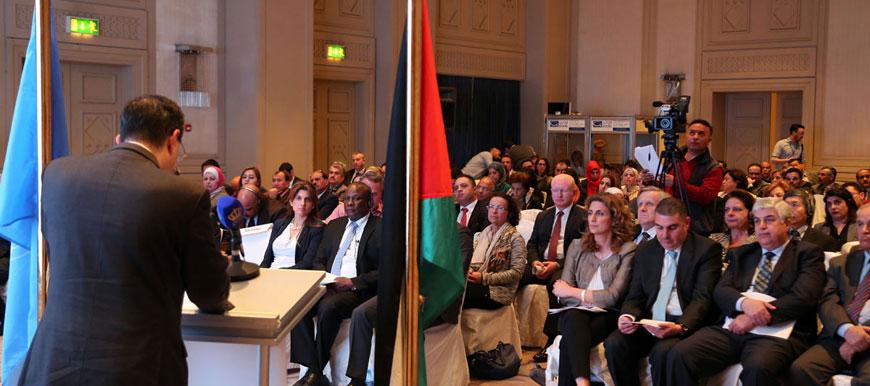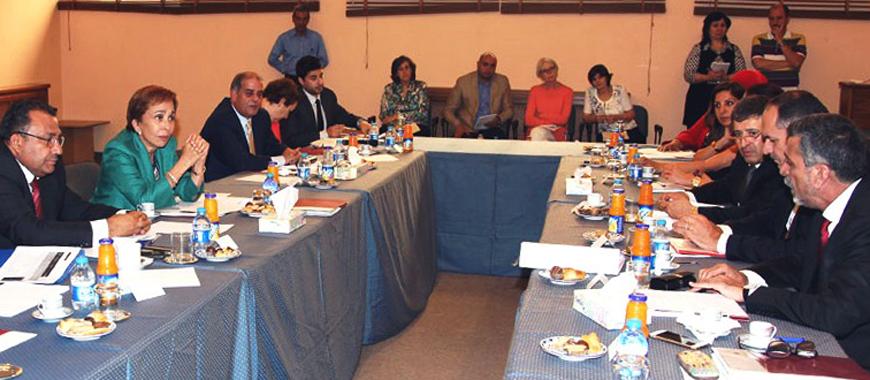You are here
Jordan gearing up for implementation of SDGs
By Dana Al Emam - Mar 08,2016 - Last updated at Mar 08,2016

Minister of Planning and International Cooperation Imad Fakhoury speaks at a workshop on means to implement the Sustainable Development Goals in Amman, on Tuesday(Petra photo)
AMMAN — With notable success in the implementation of the Millennium Development Goals (MDGs), Jordan is gearing up for the implementation of the new Sustainable Development Goals (SDGs) for the upcoming 15 years.
Speaking at the opening of a three-day workshop discussing means of implementing the SDGs on Tuesday, UN Resident and Humanitarian Coordinator in Jordan Edward Kallon said Jordan has made significant strides in achieving the MDGs over the past 15 years, particularly in the fields of education, environment and healthcare, yet more needs to be done to achieve targets related to poverty reduction, employment and gender parity.
“The 2030 agenda, with its 17 Sustainable Development Goals and 169 targets, is a plan [for] action for people to end poverty in all forms; an agenda for the planet, our common home; and an agenda for shared prosperity that also seeks to strengthen universal peace…,” he said at the meeting, attended by HH Princess Dina Mired and a large number of officials and diplomats.
Meanwhile, the UN official noted that regional unrest, scarce resources, the global financial crisis of 2008, the “Arab Spring” and the continuous influx of refugees into Jordan has hindered some of the progress made in achieving the MDGs.
Kallon said the past two years witnessed consultations with 3,000 Jordanian men and women over the SDGs, in addition to over 50,000 votes for the MY World survey, where participants rated what they thought are their top development priorities.
As the new development strategy pledges to “leave no one behind”, Kallon said the UN is ready to support Jordan in achieving the SDGs, including mainstreaming, policy integration, the design of policies, and programming and monitoring results.
For his part, Minister of Planning and International Cooperation Imad Fakhoury highlighted Jordan’s commitment to incorporating the MDGs into national strategies and plans since their announcement in 2000, adding that the vast majority of the targets were either accomplished or marked by significant progress.
For the new SDGs, which were incorporated into Jordan’s 2025 vision, “transparent and comprehensive” consultations with all stakeholders, including civil society organisations, women, young people and the private sector, have taken place to ensure inclusiveness of development planning and gains, the minister said.
He added that the implementation of the 2030 targets will be carried out in partnership with UN agencies in Jordan and all consulted stakeholders, calling for intensifying efforts to spread social awareness about the SDGs.
Furthermore, Fakhoury suggested mapping SDGs with national development priorities in order to highlight commonalities and bridge gaps.
Environment Minister Taher Shakhshir, who is vice president of the Higher National Committee for Sustainable Development, highlighted the new agenda’s emphasis on the environment.
He reviewed Jordan’s efforts in addressing climate change, noting that the Kingdom needs the support of donors and the international community to reduce emissions by 12.5 per cent.
He cited the impact of regional crises on Jordan’s ability to address climate change effects, highlighting the need to build partnerships.
As the new SDGs encourage national ownership of the goals, all national institutions have to play a key role in adapting the new development framework to local contexts, said Jordanian National Commission for Women (JNCW) Secretary General Salma Nims.
She added that increasing the government’s allocations for the commission fourfold to enhance its capacities and to carry out nationwide consultations with civil society and the private sector will expand its role in the implementation of the SDGs.
The JNCW, Nims noted, was engaged in the process of preparation for the Jordan 2025 vision and the mainstreaming of gender in the Government Executive Plan for 2016-2018.
The commission is also engaged in ensuring the gender-responsive implementation of the 2030 agenda.
King Abdullah II Fund for Development Director Saeb Al Hasan highlighted the importance of sharing information about the new goals with young people across the country and building their capacities in order to play an active part in the implementation process.
He called for capitalising on innovation and entrepreneurship, as well as promoting values of tolerance and acceptance through cross-cultural programmes.
Jordan Chamber of Industry Vice President Mazen Tantash highlighted private-public partnership as key for achieving the goals, citing the private sector’s role in reducing poverty and unemployment rates.
Related Articles
AMMAN — HRH Princess Basma, chairperson of the Jordanian National Commission for Women (JNCW), on Tuesday affirmed the importance of creatin
AMMAN — Experts on Monday explored ways to apply the sustainable development goals (SDGs) to the local level, with a focus on water, energy
AMMAN — A Lower House delegation has participated in the United Nation's High-level Political Forum (HLPF) on Sustainable Development Goals












